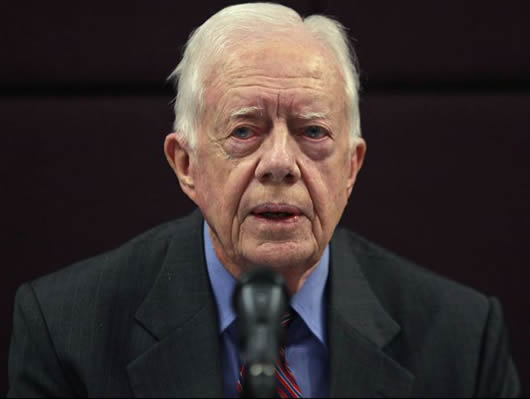
Jimmy Carter – Former US President
Former U.S. President Jimmy Carter and the Carter Center have congratulated Ghana for eliminating Guinea worm (Dracunculus medinensis), a water-borne parasitic disease that causes polio.
The World Health Organisation has finally certified Ghana as Polio Free Country.
The WHO’s International Commission for the Certification of Dracunculiasis Eradication, in consultation with Ghana’s Ministry of Health, sent a certification team to Ghana in July 2014 to assess whether transmission of the disease continued or whether it was interrupted for three or more years after the last indigenous case was reported.
On January 14, 2015, WHO Director-General, Dr Margaret Chan, provided Ghana with official notification that WHO had certified Ghana as Guinea worm-free, a release issued by the Cater Centre, copied to the Ghana News Agency on Monday, said.
“Ghana’s triumph over Guinea worm disease serves as a reminder to the world and the remaining endemic countries that the greatest challenges can be overcome with hard work, political commitment, and the support of the international community,” President Carter, founder of The Carter Center, said.
President Carter has recalled seeing his first case of Guinea worm disease in Denkyira, a village near the Ghanaian capital Accra, in March 1988.
The Carter Center began leading the international Guinea worm eradication campaign in 1986. The following year, Ghana became one of the Carter Center’s Guinea Worm Eradication Program first country partners.
Nearly 180,000 cases of Guinea worm disease were reported during the county’s first national case search in 1989. This ranked Ghana second in the world in cases at the time.
Strong partnerships throughout the campaign helped the nation overcome many challenges and setbacks, including a massive Guinea worm outbreak in Savelugu in 2007.
As a result of redoubled programme efforts and reaffirmed national and international commitments, cases were reduced the following year by 85 per cent, the greatest single-year reduction of any moderately endemic country in the history of the campaign.
In May 2010, Ghana reported and contained its last indigenous case, indicating that the disease cycle had been broken after a 22-year (1988-2010) nationwide battle.
Today, Guinea worm disease remains endemic in pockets of South Sudan, Mali, Chad, and Ethiopia. On January 12, 2015, the Carter Center announced that there were 126 provisional Guinea worm cases reported in 2014. When the campaign began, there were an estimated 3.5 million cases in 21 countries in Africa and Asia.
Critical to the campaign’s success has been long-term collaboration at the community level as well as among the national ministries of health and key implementing partners.
For a disease to be eradicated (worldwide), every country must be certified as free of the disease, even if transmission has never taken place there. To date, 198 countries and territories have been certified.
The WHO is responsible for certifying countries as Guinea worm-free, and is the only organization that can officially certify the eradication of a disease.
Guinea worm disease afflicts the world’s poorest and most isolated communities, and is contracted when people consume Guinea worm-contaminated water. After a year, a meter-long worm slowly emerges from the body through a painful blister in the skin.
The ancient disease is being wiped out through health education and behaviour change, for example by teaching people to filter all drinking water and keeping anyone with an emerging worm from entering water sources.
There are no vaccines or medicines to prevent or treat the disease.
Dr Donald Hopkins, Carter Center’s Vice President of Health Programmes, who has led the international campaign said: “The last cases of any disease are the most challenging to wipe out, especially when stability is threatened in the endemic communities of South Sudan and Mali, but we know that with the international community’s support, eradication of Guinea worm disease is not a question of if, but when.”
Source: GNA











